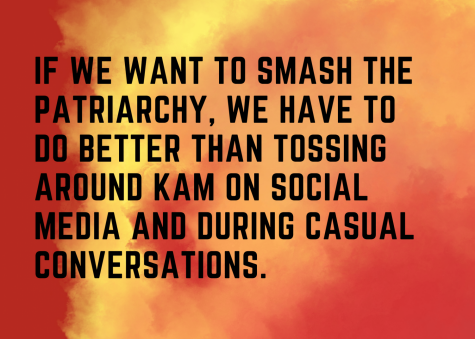Let’s denounce KAM
Advocating to use more meaningful rhetoric as opposed to inflammatory phrases such as “Kill All Men”
December 16, 2020
Kill all men.
Some say it’s empowering. Some say it’s funny. Some say it’s perhaps the newest branch of feminism: teenage-girl edition.
Yet isn’t it just — to put it simply — absurd?
Kill all men, more commonly referred to as KAM, has recently started to populate social media platforms such as TikTok, Snapchat and Instagram. The trend is supposed to resemble dark humor, its most common usage being teenage girls aiming it at a particular group of people, generally misogynistic teenage boys who make derogatory comments or actions toward women. And while dark humor is meant to be just that, humor, the inflammatory nature of this phrase upends its purpose, veering towards a tendency to conflate misandry and feminism.
It is obvious that KAM does not actually advocate for violence, nor does it refer to every single male. What it actually advocates for is for teenage girls to be taken seriously, to be given the respect they deserve. And yet, rhetoric has implications. Not only is it off putting for men and does nothing to alleviate the burden of misogyny, but it seems altogether meaningless. Radical rhetoric has potential to be meaningful — it has proved meaningful in the past, often serving as a catalyst for movements that demand equality and freedom — but when the rhetoric has a vague purpose and a convoluted goal, it loses meaning. If we want to smash the patriarchy, we have to do better than tossing around KAM on social media and during casual conversations.
Some may argue that KAM being inflammatory and its flippant use is precisely what makes it powerful — women are taught to bite their tongues, to stay quiet, to think twice before they speak. Throwing around a phrase that feels careless is, in a way, freeing. It’s empowering. Because when the universal language for women has been oppression, it is powerful to introduce a new universal language, even if it’s crude, even if it seems pointless and bizarre.

But that’s the problem though, isn’t it? That language can be universal, and that rhetoric matters. And when rhetoric fails to align with a cause’s goals, it fails. We don’t want to kill all men — we want to kill misogyny. And by failing to adequately express doing so, the misogyny persists.
And it’s not just KAM. The labels that we’ve assigned to other problems do the same. When we say toxic masculinity, the rhetoric implies that masculinity is inherently toxic, once again proving counterproductive. Toxic masculinity really means that society’s warped definition of masculinity is toxic, and that men should be given the freedom to adhere to whatever form of masculinity they feel most comfortable with. When people misinterpret this meaning and are directed away from conversations about toxic masculinity, the people who perhaps needed to hear the message the most don’t listen. Shouldn’t we call it mindful masculinity?
And sometimes we do better than KAM. When we chant “trans women are real women,” we say what we really mean, because trans women are real women, and the feminism that denies this is not truly feminism.
KAM is a microcosm of a larger issue, the issue with failing to realize just how much rhetoric matters. It matters when some boys declare that their latest math test raped them, as if minimizing rape to a challenging math problem is okay. And conversely, it also matters when some girls say KAM out of frustration or irritation, as if a phrase as radical as wanting to kill all men will do anything even remotely productive.
We need to place more thought behind our rhetoric and make it more powerful — we need to denounce KAM.
Because believe it or not, there are better ways to smash the patriarchy.
















